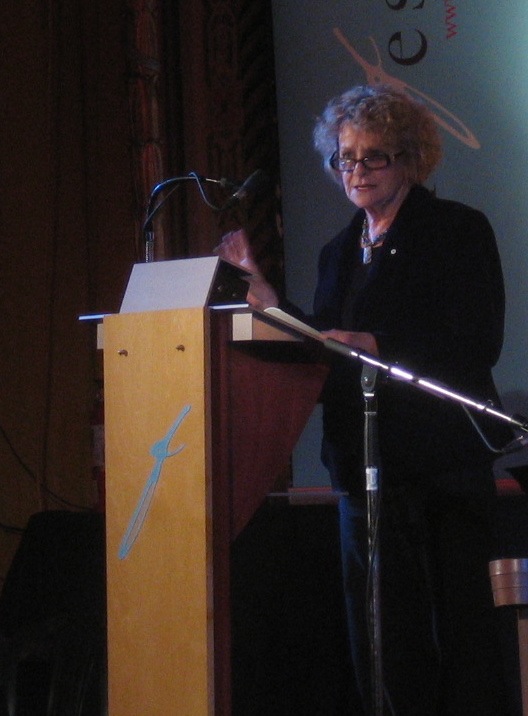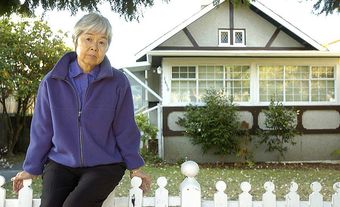
Sandra Birdsell, Ottawa Writers Fest (Fall 2010).
Early Life
The fifth of 11 children, Sandra Birdsell and her family moved to Morris, Manitoba from Hamiota shortly after her birth when her father joined the army in 1943. (See alsoSecond World War.) Birdsell’s father was French-speaking and of Cree-Métis heritage. Her mother was a Low-German-speaking Mennonite born in Russia.
In 1950, there was a major flood in Morris, the city where Birdsell was raised. The disaster came to influence her writings as an adult; the first three stories in her short story collection Night Travellers (1982) are based on that flood, and her first children’s book was also about a flood. (See alsoFloods in Canada).
Like most of her fictional characters, Birdsell has always lived on the Prairies. She left home at 15, settling first in Winnipeg and then moving in 1996 to Regina, Saskatchewan where she currently lives and works.
Education
Birdsell took a writing workshop with English professor Rudy Wiebe at the University of Winnipeg (ca. 1978–79), and subsequently, at the age of 35, enrolled in a creative writing course with Canadian novelist Robert Kroetsch at the University of Manitoba. She also studied creative writing with writer Jack Hodgins at the Saskatchewan Summer School for the Arts in 1982.
Writing Career
Birdsell began writing when she was a girl, but it wasn’t until after she had three children (and had worked a variety of jobs, including as a seamstress, cocktail waitress and Avon lady) that she started to earn a living as a writer. To date, she has written nine books — short story collections and novels — to critical acclaim
Birdsell’s first two short-story collections, Night Travellers (1982) and Ladies of the House (1984), explore the familial and psychological problems of characters in rural and urban settings. The members of the Lafreniere family, portrayed in many of the stories, seek a contentment that eludes them in the fictional town of Agassiz, Manitoba. Birdsell’s female characters often feel trapped in the domestic sphere and in their roles as daughters, wives and mothers. The stories in these two volumes were published together under the title Agassiz Stories (1987). Birdsell’s third collection of stories, The Two-Headed Calf, won the Saskatchewan Book of the Year Award in 1997. Rather than a common setting, these stories share a theme, as they are all concerned with the concept of duality.
Birdsell’s first novel, The Missing Child (1989), is also set in Agassiz, which is here on the verge of being flooded by a melting underground glacier. This multi-voiced novel, which combines a naturalistic narrative with moments of magic realism, was awarded the WH Smith Books in Canada First Novel Award. In The Chrome Suite (1992), middle-aged scriptwriter Amy Barber reconstructs the events of her past in an effort to understand her feelings of dissatisfaction with her life, as she drives from Toronto back home to Manitoba. The Chrome Suite was shortlisted for a Governor General’s Award and won the McNally Robinson Book of the Year Award.
The Town That Floated Away (1997) is Birdsell’s first children’s book. Influenced by her own youth experience with a flood, this book follows the adventures of Virginia Potts, a girl who is left behind when her town floats away.
Birdsell draws on her Russian Mennonite heritage in The Russländer (2001). This epic family story is set in the chaotic and violent upheaval of early 20th-century Russia. The life-changing and devastating events are remembered from a child’s perspective, that of Katya Vogt, an elderly woman now living in Winnipeg. The Russländer was shortlisted for the Scotiabank Giller Prize and was named the Saskatchewan Book of the Year. Birdsell continues the Vogt family saga in her 2005 novel Children of the Day. Sara Vogt lives in rural Manitoba, the wife of Métis Oliver Vandal and a mother of ten children. The story takes place during one day, in June 1953, a day when internal and external pressures build and threaten to destroy this family. As in her other works, it is Birdsell’s careful attention to details and individual voices that allow readers to connect with these characters.
Birdsell’s 2010 novel, Waiting for Joe, was nominated for a Governor General’s Literary Award for English Language Fiction. The novel focuses on a financially ruined homeless couple, and much of the story takes place in the parking lot of a Regina Walmart, where the couple’s stolen RV has run out of gas.
Michael Ondaatje described Birdsell as “one of our best writers — no compromises, no hesitance.” Her work has appeared in The Oxford Book of Canadian Short Stories, The Penguin Anthology ofStories By Canadian Women, and From Ink Lake, among other anthologies.
Teaching Positions
Birdsell has taught creative writing and served as writer-in-residence at universities and institutions across Canada, including the Regina Public Library, McMaster University, the University of Waterloo and the University of Alberta. In 2007, she was the Carol Shields writer-in-residence at the University of Winnipeg.
Honours and Awards
- Gerald Lampert Award for Night Travellers, League of Canadian Poets (1984)
- First Novel Award for The Missing Child, WH Smith Books in Canada (1989)
- Joseph B. Stauffer Award for Meritorious Achievement, Canada Council for the Arts (1991)
- Shortlist, Governor General’s Award for The Chrome Suite (1992)
- Writer’s Trust Engel/Findley Award — a prize given to a Canadian woman writer in mid-career for her body of work (1993)
- Nominated, Juno Award for The Child’s Play Collection (1994)
- Saskatchewan Children’s Literature Award for The Town That Floated Away (1997)
- Shortlist, Governor General’s Award for The Two-Headed Calf (1997)
- Book of the Year for The Two-Headed Calf, Saskatchewan Book Awards (1997)
- Shortlist, Silver Birch Award for The Town That Floated Away, Ontario Library Association (2000)
- Shortlist, the Scotiabank Giller Prize for The Russländer (2001)
- Saskatchewan Book of the Year for The Russländer (2001)
- Longlist, International Dublin Literary Award for Children of the Day (2007)
- Shortlist, Governor General’s Award for Waiting for Joe (2010)
- Member, Order of Canada (2010)
- Member, Saskatchewan Order of Merit (2012)
- Queen Elizabeth II’s Diamond Jubilee Medal (2002)
- Cheryl and Henry Kloppenburg Award, Saskatchewan Writers’ Guild (2014)

 Share on Facebook
Share on Facebook Share on X
Share on X Share by Email
Share by Email Share on Google Classroom
Share on Google Classroom




